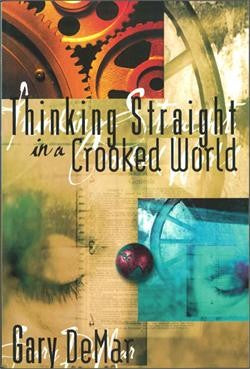In this second part of his interview with David Vaughn, Gary discusses worldviews and their importance.
The Bible states, “The fear of the LORD is the beginning of knowledge” (Prov. 1:7). True knowledge does not take place unless one begins with the presupposition that God exists and His Word is supreme. If the starting point is something other than God and His Word, then that other thing becomes the ultimate governing presupposition. “If the Word required something more certain than itself to give it validity, it would no longer be God’s Word.”[1] This means that at one level the facts do not speak for themselves. They are always interpreted in terms of a person’s adopted worldview that is constructed from a network of presuppositions. Objectivity and neutrality, as they relate to worldviews, are myths.
Beware of the man who tells you that he will explain—fully explain—any complex human action or event by resort to “coldly objective,” “empirically verifiable,” “statistical data.” He is deceiving himself, and perhaps seeking to deceive you.
For in the first place we do not all see the same event in exactly the same way, let alone interpret it the same way—not even events which do not involve the complicating factor of human purpose.[2]
Presuppositions are the deciding factor in determining how facts are interpreted and combined to give particular content to a worldview. “A presupposition is something assumed or supposed in advance… One could say that to ‘presuppose’ is to conclude something before the investigation is commenced.”[3] A presupposition is not proved by anything else more ultimate. For purposes of reaching answers to fundamental questions, a presupposition is “a belief over which no other takes precedence.”[4]
A person who asserts that all things must be tested by the standard of reason has assumed—ultimately presupposed—that reason is the test for truth. If he appeals to some other principle to verify that reason is ultimate, then that new principle becomes ultimate. When there is no other principle upon which to appeal, an ultimate presupposition has been established. Ultimately, how does a person know that reason— or anything else, for that matter—is the standard?

Thinking Straight in a Crooked World
The nursery rhyme ‘There Was a Crooked Man’ is an appropriate description of how sin affects us and our world. We live in a crooked world of ideas evaluated by crooked people. Left to our crooked nature, we can never fully understand what God has planned for us and His world. God has not left us without a corrective solution. He has given us a reliable reference point in the Bible so we can identify the crookedness and straighten it.
Buy NowIn this second part of his interview with David Vaughn, Gary discusses worldviews and their importance. Everyone, regardless of religious belief or lack thereof, has a worldview. Facts do not self-interpret; facts are interpreted by people and all people interpret through a particular grid of what they believe about ultimate truth and reality. Worldviews are inescapable, and it is vital to understand this in order to effectively communicate with others, otherwise we will talk past the issues and each other.
Click here for today’s episode
Click here to browse all episodes of The Gary DeMar Podcast
[1] Edward John Carnell, An Introduction to Christian Apologetics (Grand Rapids, MI: Eerdmans, 1948), 66. Emphasis in original.
[2] Silvester Petro, The Kingsport Strike (New Rochelle, NY: Arlington House, 1967), 27–28.
[3] Josh McDowell, The New Evidence that Demands a Verdict (Nashville, TN: Thomas Nelson, 1999), 351
[4] John M. Frame, The Doctrine of the Knowledge of God (Phillipsburg, NJ: Presbyterian and Reformed, 1987), 45, 125.

